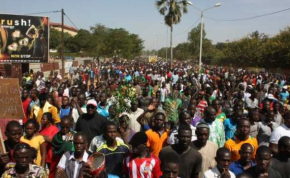 Photo: Fasozine
Photo: FasozineMore than one million people to the streets to deter President Blaise Compaore from changing the constitution of Burkina Faso in order to a third term in 2015.
ANALYSIS
By Paul MellyHave we been watching Burkina Faso's people power revolution – or just a wave of angry urban protest that will be contained as President Blaise Compaoré's regime regains its nerve?
Burkina Faso rarely makes the headlines. It is less known for politics than for hosting Africa's leading film festival.
President Blaise Compaoré has sought to retain domestic support and international confidence through economic development, presenting himself as the face of stable continuity. West Africa's preeminent diplomatic crisis mediator, he is also a key security ally of the West.
But Compaoré's regime now faces its gravest crisis since he seized power almost 27 years ago following the unexplained murder of his close colleague, the charismatic revolutionary leader Thomas Sankara.
Now in 2014, seeking to change the constitution so he could run for up to three more consecutive terms of office – starting with next year's presidential election – he appears to have pushed popular acceptance beyond breaking point.
Earlier this week, hundreds of thousands of people filled the streets of Ouagadougou to demonstrate against a planned parliamentary vote to approve the constitutional change.
Confident it was assured the votes of the necessary 75 per cent majority of parliamentarians, the regime decided to go ahead with the vote anyway. The debate was scheduled for yesterday morning.
But it had to be abandoned after demonstrators broke into the national assembly and set it on fire. They also forced national television off air before moving on to gather outside the presidential palace.
Protesters also trashed the home of a government parliamentarian, the hotel where parliamentarians were reportedly lodged before the constitution debate, and the home of the president's brother François. There have been protests in Bobo Dioulasso, the country's second city too, while in Fada Ngourma protesters had already looted the office of the ruling Congress for Democracy and Progress (CDP) earlier in the week.
While loyalist security forces such as the presidential guard tried to resist the protesters – around 30 of whom were killed – some army units appear sympathetic to the demonstrators.
Compaoré appeared on television last night insisting he would remain in office through a transition before handing power to 'the elected president' – vague wording apparently intended to keep his options open.
But the opposition has maintained pressure with further demonstrations and this morning an armed forces chief of staff spokesman has addressed crowds in Ouagadougou, promising that the army will oversee a democratic transition.
A joint United Nations/African Union/ECOWAS mediation team is set to meet key players in Ouagadougou today.
What will it mean?
Have we been watching Burkina's people power revolution – or just a wave of angry urban protest that will be contained as the regime regains its nerve?
At the very least, these events demonstrate the depth of urban disenchantment with Compaoré, who has never commanded the sort of popular affection felt for Sankara – posters of whom are still widely on sale on Ouagadougou street stalls more than 26 years after his death.
There is anger at the growth of corruption. A once admired focus on grassroots development has faded, while a well-connected elite has grown prosperous. Three years ago, a wave of army mutinies over soldiers' pay and conditions exposed the state machine as more fragile than had been imagined.
It is against this context that the proposal relaxation of presidential terms limits finally breached public tolerance.
It was also a drastic misjudgement of political tactics on the part of the regime. If, as originally expected, Compaoré had opted for a referendum to secure constitutional change, he might well have pulled it off – using his presidential profile to mobilise the vote of the placid rural majority in his favour.
Instead, it is the very immediate survival of his presidency that is in now jeopardy.
African impact
There is much speculation about the wider implications for Africa – where a number of other presidents also appear to have designs on relaxing constitutional term limits. Only last week, addressing a Chatham House audience, Rwanda's Paul Kagame dropped a broad hint of designs in this direction.
But the impact of this week's events in Ouagadougou – watched across the continent on satellite TV – may vary, depending on the region.
They must surely give pause for thought to President Thomas Boni Yayi of neighbouring Benin – where any attempt to change term limits would dramatically challenge a well-established tradition of regular democratic changes of power.
Indeed, the entire Economic Community of West African States (ECOWAS) bloc is formally committed to respect for constitutional democracy.
In Niger, a third term bid by former president Mamadou Tandja provoked his removal by the army in 2010, followed by a transition to new elections. In Senegal, President Abdoulaye Wade did manage to change the rules, only to be punished by the voters with crushing defeat in the subsequent election in 2012.
However, political culture in central Africa and the Great Lakes is rather different and authoritarian traditions are still influential in some countries. Few would bet against Kagame or Congo-Brazzaville's Denis Sassou-Nguesso successfully pushing through a rule change to open their way to further terms of office.
Burundi's Pierre Nkurunziza and Joseph Kabila of the Democratic Republic of Congo might also be tempted to follow suit – although for them it could be a higher risk exercise, governing countries with vocal civil society and state machines of limited establishment power.
Burkina Faso has demonstrated that in today's Africa popular acquiescence cannot be taken for granted.
Paul Melly is an Associate Fellow, Africa Programme, Chatham House. This article was updated on 31 October.











No comments:
Post a Comment
Note: only a member of this blog may post a comment.